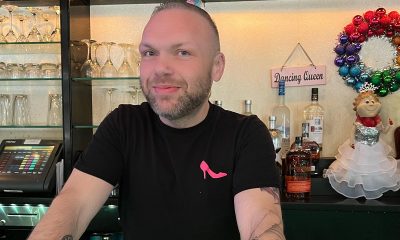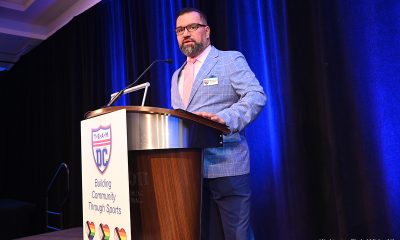Sports
Parents of gay athletes say sports brought them closer
Two local families on the powerful bond of competition
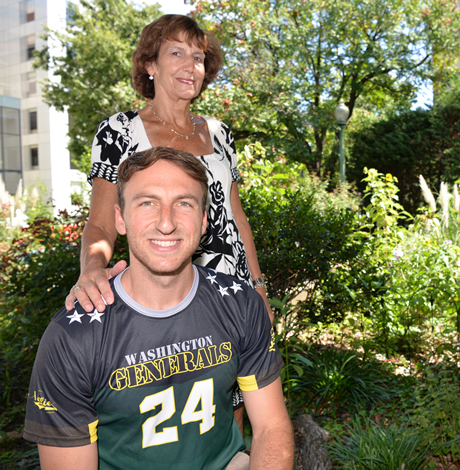
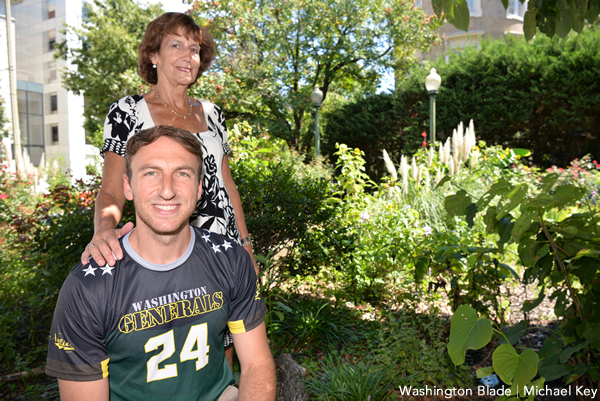
Mark and Margie Hofberg say a shared love of sports has brought them closer. (Washington Blade photo by Michael Key)
There is a family bond that occurs between parent and child when sports are a part of their everyday life. Between shuttling their children to practices, leagues, local tournaments and travel tournaments, a dynamic emerges for the parents that forms a way of life.
Sharing sports can foster a relationship that continues well into the child’s adult years. It’s a commonality that revolves around support and spending time together.
What happens when the child comes out as gay and continues to play sports? Does the dynamic change? Is it even still there?
Mark Hofberg grew up in Rockville, Md., and played multiple sports including travel-level basketball, soccer and baseball. He had a gangly phase in high school – growing one foot in a year – that relegated him to running cross country and playing frisbee and basketball recreationally while his body developed.
After coming out in his senior year of high school and growing into his 6’5” frame at the University of Maryland, Hofberg played club frisbee and any intramural sport you can think of from badminton to volleyball. He continued that through graduate school at Maryland.
Since 2012, he has been a part of the LGBT sports community in D.C. playing with the DC Gay Flag Football League, DC Pride Volleyball, Federal Triangles Soccer, DC Sentinels Basketball, Stonewall Kickball and Stonewall Dodgeball. He is in his fifth year of alternating between quarterback and captain for the Washington Generals flag football travel team.
“The LGBT sports community has given me an outlet that I need to play competitive sports,” says Hofberg. “I love it, and along with it I have found my best friends.”
Hofberg, who works in policy writing and research for an environmental nonprofit, says the person who has always been his biggest supporter is his mother, Margie Hofberg. DC Gay Flag Football is his main sport and wanting to share it with her, he asked if she would attend a game.
“She was very cautious at first, asking if I was sure she should come,” Mark Hofberg says. “Football and the league are a huge part of my life and I share everything with her. Why not share my friends?”
Margie Hofberg did indeed start coming to games and is now a regular on the sidelines along with sponsoring one of the teams through her Residential Mortgage Center. As part of her commitment as a sponsor, she runs “How to Buy a House” workshops for the players every season.
“I knew this would happen – she’s friends with more people than I am. She even goes to games when I am not there,” says Mark Hofberg, laughing. “It’s a great way for us to hang out and see each other. My dad, brother and grandfather have also been to games. I love sharing my life with my family.”
Margie Hofberg has been there all along, including coaching his youth soccer team and managing his youth baseball team.
“Whatever sport he was in, I was there supporting him and I loved every minute of it,” says Margie Hofberg. “The one thing I said when he came out to me was ‘I hope you understand you are still having my grandchildren.’”
She decided to become a sponsor of the DC Gay Flag Football League after attending Gay Bowl in Philadelphia in 2014.
“Once I saw what this community was about I wanted to become more involved and I have developed relationships beyond being Mark’s mom,” Margie Hofberg says. “Here is a group of people who are just like him and I am so glad he has an outlet to meet people. I have seen a different side of Mark emerge.”
For the Hofbergs, the sports story continues and it still revolves around support and spending time together. Margie Hofberg’s presence on the sidelines hasn’t gone unnoticed by the other players.
“I hope that seeing how Mark and I interact has helped motivate other players to start a discussion with their own family and friends,” she says. “I am so very proud of all the players in this league.”
Soccer has always been John Whitfield’s main sport and his father was a coach of his youth soccer team. When he moved on to a traveling club team, both his parents remained involved, coming to practices and games.
In his high school years in his hometown of Marysville, Wash., Whitfield played both school and club soccer and he spent two seasons playing soccer at Wartburg College. When he returned to finish his degree at Western Washington University, he continued in club and intramural soccer.
His parents had traveled to Wartburg in Iowa to see him play and the sports dynamic was still there in his collegiate years. Whitfield came out in the spring of his senior year at Western Washington.
“Soccer was always a part to focus on to separate myself from being gay. I used soccer as an excuse not to date,” says John Whitfield. “At my college graduation party, I did it all at once – came out to friends and family. I talked to a lot of people about it that day.”
He landed a job with Microsoft where he consults with the Department of Veterans Affairs, and right out of college they moved him to D.C. where Whitfield joined the Federal Triangles Soccer Club.
“My first team was very social and I stopped being afraid that playing with a gay soccer team was a gay thing,” John Whitfield says. “My two lives were finally merged together.”
Whitfield told his parents about the Federal Triangles and says they were intrigued and pleased that he was playing and meeting people. On their visits to D.C., both Debbie and Don Whitfield have attended their son’s soccer matches.
Whitfield has traveled with his team to the Gay Games and a tournament in New York. In 2016, he traveled with the Federal Triangles to the International Gay and Lesbian Football Association World Championships in Portland.
Sitting in the stands were his parents, his partner Hank, and his sister and her boyfriend. They had driven more than four hours to watch John compete. The final was played in the Portland Timbers Stadium and the Federal Triangles went on to win the world title.
“They have always been there to support me,” says John Whitfield. “Having them there to watch me play in that (MLS) stadium with my team was incredible.”
John Whitfield has two older sisters who also played soccer and their father Don was involved early on, recognizing the value in sports.
“Participating in athletics is a good learning experience for life in general,” says Don Whitfield. “When I was coaching them, it was also a good family experience. It has always been just a joy to watch my kids play.”
John advanced to the premier league at age 11 and the family experiences continued going from state to state for regional tournaments. Watching his son play continued during John’s college years.
Don Whitfield says he didn’t know that there were gay sports communities but that he is glad that they exist.
“I had seen him play in some big stadiums before Portland but it was very fun to watch him there playing at a competitive level. He is such a tough player,” Don Whitfield says. “I also enjoyed hanging out with his team afterwards when we went out for beers.”
The Whitfield family sports story remains strong and despite living on separate coasts, they continue to see each other on a regular basis.
“Before he came out, I could never put my finger on the tension because I didn’t have the tools to figure it out. Our relationship has improved dramatically because the fear is gone,” says Don Whitfield. “John is much more relaxed and my wife and I will always continue to be supportive.”

FIFA has announced Saudi Arabia will host the 2034 World Cup, despite concerns over its human rights record that includes the death penalty for homosexuality.
The Associated Press reported FIFA confirmed the decision on Dec. 18. The AP noted Saudi Arabia is the only country that bid to host the 2034 World Cup.
“This is a historic moment for Saudi Arabia and a dream come true for all our 32 million people who simply love the game,” said Sport Minister Prince Abdulaziz bin Turki Al- Faisal, who is also president of the Saudi Olympic and Paralympic Committee, in a statement the Saudi Press Agency posted to its website.
Saudi Arabia is among the handful of countries in which consensual same-sex sexual relations remain punishable by death.
A U.S. intelligence report concluded Saudi Crown Prince Mohammed bin Salman “likely approved” the murder of Jamal Khashoggi, a Washington Post columnist, inside the Saudi Consulate in Istanbul in 2018. A federal judge in 2022 dismissed a lawsuit against Prince Mohammed after the Biden-Harris administration said he was immune to the lawsuit because he is the country’s prime minister.
Human rights activists have also criticized the Saudi government over the treatment of women, migrant workers, and other groups in the country.
“No one should be surprised by this,” Cyd Zeigler, Jr., co-founder of Outsports.com, an LGBTQ sports website, told the Washington Blade in an email after FIFA confirmed Saudi Arabia will host the 2034 World Cup. “FIFA, the International Olympic Committee, and many other world governing bodies routinely turn to authoritarian countries with terrible human-rights records to host major sporting events. There are simply few other countries willing to spend the billions of dollars it takes to build the needed infrastructure.”
Peter Tatchell, a long-time LGBTQ activist from the U.K. who is director of the Peter Tatchell Foundation, in a statement described FIFA’s decision as “a betrayal of the values that football should stand for: Inclusivity, fairness, and respect for human rights.”
“This is not about football; it’s about sportswashing,” said Tatchell. “The Saudi regime is using the World Cup to launder its international image and distract from its brutal abuses. By granting them this platform, FIFA is complicit in whitewashing their crimes.”
Qatar, which borders Saudi Arabia, hosted the 2022 World Cup.
Consensual same-sex sexual relations remain criminalized in Qatar.
“Saudi Arabia was the only country to bid for the 2034 FIFA World Cup,” said Zeigler. “So, until FIFA, the IOC (International Olympic Committee) and other governing bodies ban major human-rights violators from hosting, we’ll continue to see events like this in Saudi Arabia, China, Qatar, and other countries with terrible LGBTQ rights issues.”
The Blade has reached out to FIFA and the Saudi government for comment.
Sports
Controversy grows over member of Calif. university’s women’s volleyball team
Coach suspended, NCAA sued, more rivals forfeit
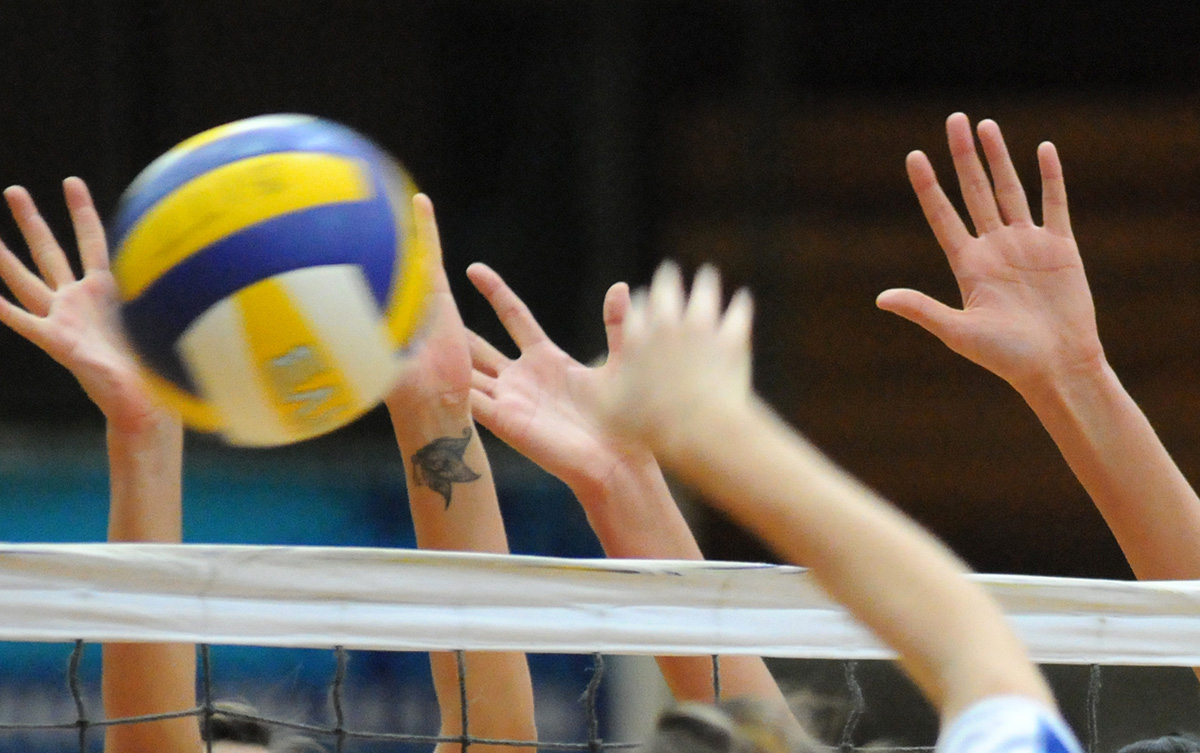
San Jose State University’s women volleyball team has collected yet another W by forfeit — its seventh so far this season — as controversy swirls around one player on its roster. She’s one of the seniors, and she has been dragged in the media by her own co-captain, who outed her as transgender.
The Washington Blade is not naming this student athlete since neither she nor the school have confirmed or even commented on her gender identity.
SJSU visited San Diego last weekend for a match before the Aztecs’ biggest home crowd of the season — including protesters waving “Save Women’s Sports” banners and booing one player on the Spartans team in particular: The woman who is reported to be trans.
Security was tight, with metal detectors and extra guards and police officers present. Video posted to YouTube by a right-wing sports media site — which names the player — shows an angry fan arguing with security about his First Amendment rights.
Video recorded during Nov. 9’s game shows a player for San Diego was injured following a spike by the player rumored to be trans, and had to be helped off the court. However, the video clearly shows that player was injured by landing poorly on one foot, not as a result of the spike.
The Aztecs defeated the Spartans 3-1, but San Jose has still punched its ticket to the conference finals, thanks to its record number of forfeits.
Wyoming was set to visit SJSU Thursday, but for the second time is joining other universities that have forfeited games against the Spartans, all without providing a reason. Boise State announced it will forfeit an upcoming match set for Nov. 21, its second forfeit against SJSU.
In September, the Spartans’ co-captain, senior Brooke Slusser, outed her own teammate, the player at the center of this controversy, in joining a federal lawsuit against the NCAA spearheaded by anti-trans inclusion activist and former college athlete Riley Gaines.
Slusser said in the lawsuit and in subsequent interviews that the player in question shouldn’t be on her team. The suit claims the NCAA’s policy on trans athletes violates Title IX by allowing “men” to compete in women’s sports and use women’s locker rooms where they display “full male genitalia.”
The NCAA policy for trans athletes participating in women’s volleyball aligns with that of USA Volleyball, which requires trans female athletes to suppress their testosterone below 10 nmol/L for a period of one year before competition. That is also how the NCAA determines eligibility. SJSU has stated repeatedly that all its players are eligible.
The lawsuit also asks the NCAA to revoke any titles or records won by trans female athletes in women’s competitions, which seems to be specifically aimed at stripping out trans NCAA champions Lia Thomas and CeCé Telfer of their titles in swimming and track and field, respectively.
Prior to this season, the player rumored to be trans did not attract any attention other than being a successful starter, like Slusser. But now that she is in the media spotlight, Slusser has come forward to tell right wing media, including Megyn Kelly, why she feels another woman two inches taller than she is poses a danger.
“I don’t feel safe,” Slusser said on “The Megyn Kelly Show” last month. “I’ve gone to my coaches and said I refuse to play against [her] … It’s not safe.”
In the video, both Kelly and Slusser refer to the player as “him” and a “man,” and name her.
Now comes another twist: San Jose State University suspended associate head coach Melissa Batie-Smoose with pay, indefinitely, after she filed a Title IX complaint against SJSU. She claims the player Slusser identified as trans conspired with an opponent to help the team lose a match and injure Slusser. Batie-Smoose named the player in question in her complaint and on Sept. 23, joined the same lawsuit that Slusser is now a part of.
“Safety is being taken away from women,” Batie-Smoose told Fox News. “Fair play is taken away from women. We need more and more people to do this and fight this fight because women’s sports, as we know it right now will be forever changed.”
Media reporting on the suspension, including Fox News, continue to name the athlete in question, with some also reporting what they say is the athlete’s birth name.
San Jose State released a statement following the suspension of Batie-Smoose: “The associate head coach of the San Jose State University women’s volleyball team is not with the team at this time, and we will not provide further information on this matter,” the team said.
SJSU Coach Todd Kress told ESPN that reports saying that any member of the Spartans colluded with their opponent are “littered with lies.”
The Spartans are currently among the top six finishers in the Mountain West Conference that will qualify to compete in the conference tournament scheduled for Nov. 27-30.
Sports
University of Nevada forfeits game rather than play possible trans athlete
Women’s volleyball team cites ‘not enough players to compete’

For the fifth time, a women’s volleyball team has chosen to forfeit instead of play against San Jose State University, because of rumors that one of its players is a transgender woman.
The University of Nevada, Reno, officially announced on Friday that it would forfeit Saturday’s game against the SJSU Spartans. This followed an announcement by Wolf Pack players who said they “refuse to participate in any match that advances injustice against female athletes,” without providing further details.
Originally, Nevada’s athletic department had said the program would not back out from the match, citing state equality laws, but also said that no players would be disciplined if they chose to not participate.
“The vast majority of our team decided this is something we wanted to take a stand on,” Nevada team captain Sia Liilii told Fox News. “We didn’t want to play against a male player.”
“In all of our team meetings it just kept coming back to the fact that men do not belong in women’s sports. If you’re born a biological male, you don’t belong in women’s sports. It’s not even about this individual athlete. It’s about fair competition and safety for everyone.”
Outsports and several conservative and right-wing websites have identified the player who is rumored to be trans, but the Washington Blade has opted to not do so since she herself has not come forward to either acknowledge or deny she is trans.
As ESPN reported, Nevada follows Southern Utah, Boise State, Wyoming, and Utah State in canceling games against the Spartans. Boise State, Wyoming, Utah State, and Nevada are all members of the Mountain West Conference, so those contests are considered forfeits and count as valuable wins in the league standings for San Jose State.
Riley Gaines, the anti-trans inclusion activist for the Independent Women’s Forum has joined the chorus in claiming the Spartans’ roster includes a trans woman.
If you're wondering why teams are forfeiting against @SJSU, here's the reason.
Last night another woman was smashed in the face by a kill from a man posing as a woman.
It's unfair, unsafe, and regressive, yet our "leaders" remain silent. pic.twitter.com/OS15AFxQsp
— Riley Gaines (@Riley_Gaines_) October 18, 2024
Despite this, neither San Jose State nor any of the other forfeiting teams have said the university’s women’s volleyball team has a trans player. SJSU issued a statement defending its roster.
“Our athletes all comply with NCAA and Mountain West Conference policies and they are eligible to play under the rules of those organizations. We will continue to take measures to prioritize the health and safety of our students while they pursue their earned opportunities to compete,” the statement read.
The governors of Idaho, Nevada, Utah, and Wyoming — all of whom are members of the Republican Party — have issued public statements supporting the cancellations, claiming it’s in the interest of fairness in women’s sports. This week, Donald Trump, the GOP presidential nominee and former president, spoke at a Fox News televised town hall when asked about trans athletes in women’s sports.
“We’re not going to let it happen,” Trump said. “We stop it, we stop it, we absolutely stop it. We can’t have it. You just ban it. The president bans it. You don’t let it happen. It’s not a big deal.”


